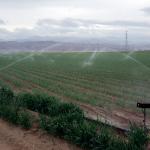Oilfield Wastewater Used to Grow Food in California May Contain Toxins

Now a new report by the Environmental Working Group says that this wastewater is possibly tainted with toxic chemicals, including chemicals that can cause cancer and reproductive harm. Farmers in Kern County have irrigated some 95,000 acres of food crops with billions of gallons of oil field wastewater, according to the report, which is based on an analysis of state data.
Actually, oil companies have been quietly selling wastewater for irrigation in California for decades, but it’s only in recent years that the matter has become public knowledge. In the past, the state required regular testing for only a handful of pollutants to satisfy permit requirements for use of wastewater on agriculture. This is the first time we are getting a detailed look at the makeup of the toxic cocktail that could be lurking in the water.
According to state data, oil companies operating in California have reported that recycled wastewater sold to Kern County irrigation districts since 2014 contained more than 20 million pounds and 2 million gallons of dozens of toxic chemicals. These chemicals included 16 that the state classifies as carcinogens or reproductive toxicants. Levels of the chemicals were not measured and a full assessment of what exactly is in this water is pretty much impossible because the companies have withheld the identity of almost 40 percent of the chemicals as so-called trade secrets.
Currently, the lightly treated wastewater is blended with fresh water and then applied to almonds, pistachios, and citrus trees, as well as to grapes, carrots, beans, tomatoes, and potatoes grown in the Cawelo, North Kern, Jasmin, and Kern-Tulare Water Districts in Kern and Tulare Counties. According to an earlier EWG report, in some of these places the water can even be used as drinking water for livestock and for farmed fish.
Although crops grown with this recycled water represent a small percentage of the food grown in the Central Valley, once the produce is at the grocery store, there’s no way of telling it apart from other fruits and vegetables.
The Central Valley Regional Water Quality Control Board has appointed an expert food safety panel to study the possible impact of using wastewater to grow food. Its findings are expected next year.
Despite the new information about the mix of toxic chemicals present in oilfield wastewater, the California water board has refused to halt the practice, and, according to EWG, it is even allowing the expansion of the irrigation method.
But EGW researchers say that while there’s cause for concern, it doesn’t mean that we should stop eating produce from California.
“Although it is well-established that pollutants in water and soil can build up in crops — especially root crops such as carrots and potatoes, which are grown in Kern County with oil field wastewater — scientists don't know if that poses a health risk for people who eat the food,” says the report, written by EWG senior scientist Tasha Stoiber. “A healthy diet high in fruits and vegetables outweighs uncertainties about chemicals in produce.”
Maureen Nandini Mitra, Editor, Earth Island Journal.In addition to her work at the Journal, Maureen writes for several other magazines and online publications in the US and India. A journalism graduate from Columbia University, her work has appeared in the San Francisco Public Press, The New Internationalist, Sueddeutsche Zeitung, The Caravan and Down to Earth.
Earth Isand Journal is a quarterly magazine that combines investigative journalism and thought-provoking essays that make the subtle but profound connections between the environment and other contemporary issues. The mix of hard-hitting exposés and inspiring stories of grassroots movements for sustainability has won numerous awards through the years. including a half dozen Project Censored Awards for uncovering stories ignored by larger media outlets. On three occasions, Utne Reader has recognized the Journal for top environmental coverage, most recently in 2007, when the Utne editors wrote: “The environment is surely the biggest news story of our day, and we're glad Earth Island Journal is on it.” The Journal’s unique brand of environmental journalism is a key resource for anyone eager to help protect our shared planet. become a subscriber today.
